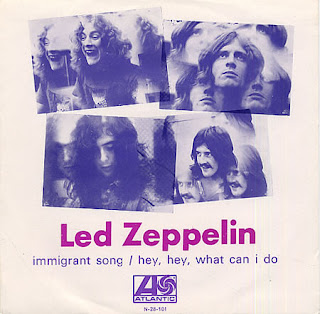LED ZEPPELIN - IMMIGRANT SONG
Publicació: 5 de novembre de 1970
Llistes: EUA: #16
"Immigrant Song" mostra un poderós riff repetitiu i incorpora temes lírics inspirats en la mitologia nòrdica. La veu dinàmica de Robert Plant evoca imatges de guerra i de Valhalla, contribuint a l'atmosfera enèrgica de la cançó. Originalment inclosa a l'àlbum de Led Zeppelin del 1970, "Led Zeppelin III", també es va publicar com a senzill.
"Immigrant Song" va ser inspirada pel viatge de Led Zeppelin a Islàndia al juny de 1970. Robert Plant es va fascinar pels mites i llegendes nòrdiques durant aquesta visita. La lletra de la cançó fa referència a aquesta experiència, incloent-hi la frase "land of ice and snow" (terra de gel i neu), que al·ludeix específicament a Islàndia. La banda la va interpretar al Bath Festival al juny de 1970, on l'aparició de Plant, amb una barba semblant a la d'un víking, va afegir-se a la imatgeria temàtica de la cançó.
La menció “Valhalla I am coming" (Valhalla, arribo) prové de la mitologia nòrdica, fent referència específica al Valhalla, una sala a Asgard on els guerrers caiguts hi són portats per les Valquíries, els esperits de la guerra. Els herois portats al Valhalla esperen la batalla final, coneguda com a Ragnarok.
"Immigrant Song" es va gravar als Olympic Studios de Londres durant l'estiu de 1970. Jimmy Page i John Bonham van enregistrar les pistes de fons en una habitació petita i baixa. La cançó va començar com una peça sense títol, caracteritzada per un tema implacable i potent. Page tocava la guitarra mentre Bonham es concentrava en la seva bateria, assegurant-se que el ritme adequat complementés el riff de Page.
La frase "The hammer of the gods will drive our ships to new lands" (El martell dels déus portarà els nostres vaixells a noves terres) es va convertir en un icona en la llegenda de Led Zeppelin, amb els fans referint-se al so de la banda com el martell dels déus. L'autor Stephen Davis fins i tot va utilitzar la frase com a títol d'un llibre sobre la banda. La fascinació de Robert Plant per la història va influir en la lletra, ja que reflexionava sobre les pressions que enfrontaven els exploradors com Marco Polo per descobrir nous territoris, similar a la pressió que sentia la banda per superar els seus anteriors èxits.
LED ZEPPELIN - IMMIGRANT SONG
Released: November 5, 1970
Charted: US: #16
"Immigrant Song" showcases a powerful repeating riff and incorporates lyrical themes inspired by Norse mythology. Robert Plant's dynamic vocals evoke images of war and Valhalla, contributing to the song's energetic atmosphere. Originally featured on Led Zeppelin's 1970 album, "Led Zeppelin III," it was also released as a single.
"Immigrant Song" was inspired by Led Zeppelin's trip to Iceland in June 1970. Robert Plant became fascinated by Nordic myths and legends during this visit. The song's lyrics reference this experience, including mentions of the "land of ice and snow," which specifically alludes to Iceland. The band performed the song at the Bath Festival in June 1970, where Plant's appearance, with a Viking-like beard, added to the thematic imagery of the song.
The mention of "Valhalla I am coming" in "Immigrant Song" draws from Norse mythology, specifically referencing Valhalla, a hall in Asgard where fallen warriors are brought by Valkyries, spirits of war. Heroes taken to Valhalla await the final battle, known as Ragnarok.
This track was recorded at Olympic Studios in London during the summer of 1970. Jimmy Page and John Bonham laid down the backing tracks in a small, low-ceilinged room. The song started as an untitled piece, characterized by a relentless, pounding theme. Page was focused on his guitar while Bonham concentrated on his drums, ensuring the right kind of beat to complement Page's riff.
"The hammer of the gods will drive our ships to new lands" from "Immigrant Song" became iconic in Led Zeppelin lore, with fans referring to the band's sound as the "hammer of the gods." Author Stephen Davis even used the phrase as the title of a book about the band. Robert Plant's fascination with history influenced the lyric, as he pondered the pressures faced by explorers like Marco Polo to discover new lands, similar to the pressure the band felt to top their previous achievements.













Cap comentari:
Publica un comentari a l'entrada